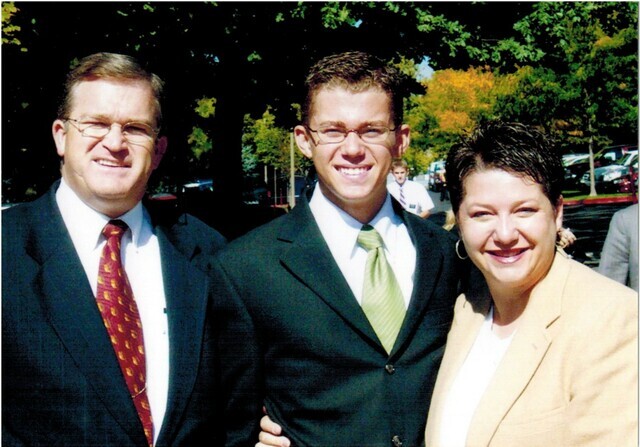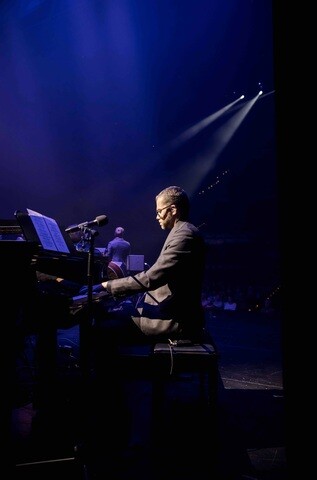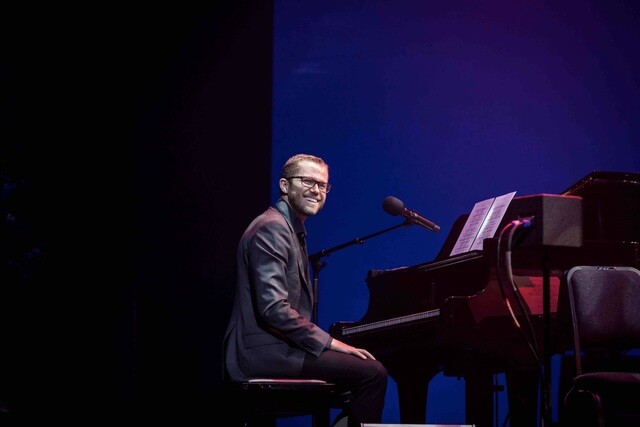When Stephen Nelson signed on as the producer of the newly formed group GENTRI, he had a few conditions: he would not perform on stage, he would not travel, he would not be in any music videos, and he would not be in any social media posts.
Yet, over the last six years, somehow each of those conditions has ended up being broken. Known unofficially as the fourth member of the “gentlemen trio,” Stephen has always sought to avoid the spotlight—but the spotlight still manages to end up on him. At concerts, what started out as a way for the group to fill some spare time in the show turned into Stephen “stealing the show.” Audiences love to play Stephen’s “movie medley mash-up game,” where he blends together two song suggestions from the crowd. (One of Stephen’s favorite mash-ups has been Tarzan’s “You’ll Be in my Heart” and AC/DC’s “Thunderstruck.”)
But when the stage lights turn off, you don’t find Stephen signing autographs with the other members of the group.
“We’re always joking, ‘Well, where’s Stephen?’” says GENTRI singer Brad Robins. “Stephen is always off in the corner talking to . . . the unassuming—the people who aren’t fighting for [our] attention. He sees people.”
Perhaps one of the reasons Stephen sees people is because he never focuses on being seen himself. Instead, he just hopes to be the conduit for beautiful music, and through that music Stephen has also been a conduit for inspiring messages. Behind the melodic tenor notes of GENTRI are arrangements and stories that hold deep meaning for Stephen. By using his talents to share these stories, Stephen has not only given listeners their own chance to connect with the music he creates, he gives them permission to find their own story within the notes. After all, within those same notes is partially where Stephen’s story of experiencing same-sex attraction ultimately found a voice. But before Stephen ever shared that story aloud, he first learned how to put his heart into the harmonies within his own childhood home.
The First Notes
White and black keys filled Stephen’s youth. Before school every day, his sisters would practice the piano, and once they left, he would take his turn at the piano bench.
“I would play by ear what they were doing, which made them very angry,” Stephen says, laughing. “When they came back from school and I’d be playing their stuff, they would hide their books from me, thinking I learned it from the books.”
The ability to play by ear was a talent that Stephen continued to develop, taking only six months of piano lessons to learn about theory and mechanics of music such as sharps, flats, and clefs. After that, he taught himself, and his sisters came to embrace his ability to play by ear and performed duets with him. Stephen’s mother would take him to the music store where they had a deal—he could have any book he wanted as long as he learned every song in the book. Which naturally, he did.
“It’s been almost compulsive my whole life to the point where my mom would have to ground me from the piano because that was the ultimate punishment if I really needed to be reprimanded,” Stephen says.
Around the age of 8, Stephen composed his first song on the piano. When he grew to be a teenager, he found an inexpensive program on the computer that allowed him to compose songs with a full orchestral score, so Stephen would add some strings here and some horns there to his original compositions. His love of orchestral music continued to grow.
Songs of the Heart
Arranging music took on a special meaning when Stephen served as a missionary for The Church of Jesus Christ of Latter-day Saints in Peoria, Illinois. During the first few months of his mission in 2005, he had an unusual but undeniably strong feeling that someone in his family would pass away during the two years he was donning his black name tag. In response to that prompting, he started to arrange a version of “Be Still, My Soul” so the piece could be ready for the funeral.
A year into his mission, his phone rang. He answered, “Hello, this is Elder Nelson from The Church of Jesus Christ of Latter-day Saints,” and heard familiar voices on the other side—his parents. His mother shared the news that she had been diagnosed with a lung cancer called adenocarcinoma. An aggressive cancer, it had already progressed to Stage 4 when doctors found it.

Stephen with his father and mother on the day he entered the Missionary Training Center. Image courtesy of Stephen Nelson.
Over the next five months, Stephen frequently thought about some counsel in his patriarchal blessing—to be grateful for his parents and to go out of his way to do nice things for them. When Church members in his mission would travel to Utah for various reasons, Elder Nelson would send them with a special delivery for his mother, such as a hug or a letter.
“I could deliver a hug to her,” he says. “That was really special because everyone who went and visited her became really close with her and my family; it was like they were part of a miracle.”
On March 1, 2007, his mother passed away. Stephen resolved to stay on his mission, but a part of him was still at her funeral as his arrangement of “Be Still, My Soul” was performed. Stephen also composed another hymn arrangement to comfort his father, “Guide Me to Thee.”
Although the veil may now separate mother and son, the special deliveries continue. Stephen describes how people, both known and unknown, will approach him and say, “I think your mom wants me to give you a message,” and then share that message.
“This is not a rare thing,” Stephen says. “It’s been over 10 years. It’s happened many, many times. It is like we tag teamed. I sent her messages on my mission and now she sends me messages from the other side.”
► You may also like: President Nelson's hopeful teachings about death and the nearness of lost loved ones: 'We die to live'
The Gentlemen Trio
When Stephen returned home from his mission, he attended Brigham Young University and obtained a degree in media music. At the same time, the three would-be members of GENTRI— Brad Robins, Casey Elliott, and Bradley Quinn Lever—had just finished performing in a production of Les Miserables at Hale Center Theater.
One night, the three tenors were at Casey’s house. Brad recalls, “Casey’s wife came home and a couple of us were sitting in the kitchen, and she looked at us and she said, ‘Hey, you guys need to form a group.’ And we kind of looked at each other like, ‘What, like a boy band? We’re kind of old to be doing that.’ And she said, ‘No, seriously, you guys could maybe do something a little different and give it a style element.’”
The entrepreneurial juices started flowing among the gentlemen, but they needed arrangements. Casey remembered a talented pianist who had accompanied him at a concert recently—Stephen. Coincidentally, Brad also knew Stephen since the two had performed and traveled together with BYU Young Ambassadors.
“I got a call from Casey saying, ‘Hey, we wanted to start a boy band,’ and I just rolled my eyes,” Stephen says. “I just thought, ‘Oh, brother. Well, good luck with that, but I’m not going to be your producer.’”
Stephen wasn’t looking to take on a fun little side project or “boy band.” His career after graduation was already sustainable. So he hoped he could arrange a couple songs for them and that would be sufficient. Until the first rehearsal.
“[Bradley, Casey, and I] all joined voices in unison on the last note of the song,” Brad says. “There was a tangible feeling in the air, and everyone felt it. It was unlike what any of us—in years and years and years of singing with people—had ever experienced.”
Stephen adds, “I thought, ‘Wow, it’s too bad this isn’t going to work between us because you guys are fantastic,’” still anticipating only minor involvement with the group. “But then they insisted on giving me a multi-slide PowerPoint of their career goals, their metrics, what they were planning on, how they were going to get there. I thought, ‘Oh, man, this might actually work!’ This budding friendship coupled with repeated moments of music magic led me to see the potential of building this with them, and I was hooked.”
Perhaps that’s why Stephen gave GENTRI the two arrangements closest to his heart very early on—“Be Still, My Soul,” which he arranged for his mother’s funeral, and the arrangement for his father, “Guide Me to Thee.”
“I never, ever was planning on giving ‘Guide Me to Thee’ or ‘Be Still, My Soul’ to an artist because I just never thought it would be a good fit,” Stephen says. “When GENTRI came along, it dawned on me that this was the perfect opportunity to immortalize these songs. There was always something a little bit off about keeping them to myself, but the stars aligned and I was given a chance to share the songs with the world.”
“Believe”
Over the next few years, GENTRI grew in popularity, performing covers and writing original songs, all with an element of cinematic pop and a swelling orchestra behind the three tenors. Some of their first performances included Time Out for Women events and the group began to release albums in partnership with Deseret Book and Shadow Mountain Records. Meanwhile, Stephen continued to amaze audiences with his ability to combine two completely different songs in the movie medley game. He also composed original songs, including one that had special meaning for him—a song that revealed a little-shared part of who Stephen was.
When Stephen performed at the 2020 North Star Conference, a conference for those trying to navigate sexual orientation and faith, it wasn't his medley of “If I Were a Rich Man” and “My Heart Will Go On” that stole the show. Instead, it was his vulnerability as he shared his journey with same-sex attraction.
Right before going on stage at the Salt Lake conference, Casey turned to Stephen and recommended he introduce the song “Believe,” which Stephen co-wrote with Anjanette Mickelsen. Casey recalls that he wasn’t quite sure what Stephen would say at that moment—maybe, at a minimum, he would talk about struggling with God and explain how he received the song through revelation. However, this would become the first time Stephen shared a yet-untold story on stage—his story about experiencing same-sex attraction for his whole life.
► You may also like: "There is a place for you": What Emily Belle Freeman and David Butler taught LGBT individuals about belonging in the Church
His story is tied to the song, a song Stephen says God gave to him—even though Stephen wasn’t ready to hear the message himself.
As Stephen tells it, years before GENTRI and the Salt Lake conference room, Stephen was en route to his friend’s house for a songwriting session. As he drove there, a melody and chorus suddenly came to his mind. He pulled over and sang the words into his phone:
- Believe, there is an answer.
- And while you feel you’re buried deep in a disaster,
- Believe more hands are waiting,
- Ready to lift you up and carry you back to safety.
- You’re not alone, keep holding on
- And believe.
“I was really excited because I just thought, ‘This song just feels like it has something special to it.’ Then I quickly remembered that I was literally angry with God at the time because I had just felt so lost for so long with experiencing same-sex attraction,” Stephen recalls. “I had lost all hope. . . . the most devastating thing I’ve ever lost in my life was hope. I’ve lost my mom. My best friend committed suicide. A lot of sad things have happened in my life, but nothing has come remotely close to the devastation of losing hope.”
Despite these feelings, he couldn’t deny the inspiration coming to him in the form of lyrics filled with promise, belief, and most significantly—hope.
At the time the lyrics came to him, Stephen had been angry with God—angry that God wouldn’t take away his same-sex attraction, angry that no matter what he did, happiness seemed to elude him, and angry that his future in the Church looked bleak. While pulled over on the side of the road, he recalls that he shook his fist in his car and yelled at God, “This had better not come with any strings attached, because if by receiving this song that means that we’re friends now or that we’re on good terms or we’re cool, then guess again, because I don’t want anything to do with you.”
Stephen describes that he felt after his tirade that God was saying, “This comes with no strings attached. You don’t have to feel any differently. This is just a message for you that I want you to have.”
Though Stephen didn’t want the message for himself yet, he kept the lyrics and composed the song for GENTRI. The tenors instantly realized its potential even without knowing the story behind it.
“Right after we sang it the first time, those lyrics and those harmonies, the way they blended together . . . we knew. We knew this song was intended to do some good things in a major way,” Brad says.

For the next year, Stephen would watch GENTRI perform this message from God—the message God had for him—and see how it affected audiences. Brad explains that in each show, “Believe” has become a crucial spot in the set list.
“For 90 minutes, your job as an entertainer, at least in our case . . . is to take the audience on an emotional journey that has highs and lows, has them laughing one minute, crying the next. But at the end of the day, even more important than the outward expression, we want them to feel something. We want them to be moved, ideally moved to action—whether that is moved to pursue a dream as we’re singing our anthem, ‘Dare,’ or to remain hopeful as we’re singing ‘Believe.’ . . . When ‘Believe’ hits . . . every single night, without fail, that is the moment that the entire atmosphere in the theater, no matter how big or small it is, changes,” says Brad.
And by watching the song open hearts in the audience, Stephen slowly let the message sink into his own heart. He eventually decided to have a conversation with God, a conversation where he would open his heart and share all of his thoughts with his Father—the anger, the questions, and the hurt. He describes the conversation that continued for five months as being “like a vision.” Stephen would express his feelings, and God would ask certain questions.
“What I learned during those five months of deconstructing all of those things that I used to think, was that I had a problem with putting words in God’s mouth,” Stephen says. “And I had a problem with telling Him who He is, and what He thinks, and how He responds, and what He thinks of me, and how—I mean, I used to believe He was disgusted with me.”
Through talking with God, Stephen realized God didn’t feel that way about him. In fact, He felt entirely opposite. The result was a commitment: Stephen promised that he would stop speaking on God’s behalf and would instead turn to Him with his questions and doubts.

“My relationship with God has never been better,” Stephen says. “I feel like we’re a team and we’re moving through life together and we’re figuring things out step by step and piece by piece.”
Stephen had planned to take his secret of same-sex attraction to his grave, not knowing how his family and friends would react. But with time, he started to realize that just as he was putting words in God's mouth, he often made false assumptions about how his family and friends would react.
When asked what advice he would give to those who have a loved one experiencing a faith crisis rooted in same-sex attraction, Stephen references a story in the Book of Mormon.
“I’ve always wondered why Sariah wasn’t chastised when she complained against Lehi like Laman and Lemuel were chastised for similarly ‘complaining.’ A closer look helped me understand that instead of expressing rebellion like Laman and Lemuel were, Sariah’s expressions were born out of a faith crisis, exhaustion, and her mourning what she believed to be the loss of her sons. Lehi rightfully looked beyond the surface expression to see what she was really going through and offered support and comfort instead of chastisement; the support and comfort Sariah really needed at that time,” Stephen says.
Stephen notes that even though at times his process of reconciling with God was ugly—sometimes he was filled with rage, and at other times he was acting the same way Sariah was acting in her faith crisis—what made all the difference was the friends and family members who, like Lehi, responded to him with patience, support, and comfort.
“When the people in my life saw me do those things which perhaps looked faithless, they had the wisdom and the foresight to stop themselves from responding with a chastising knee-jerk reaction and instead asked themselves, ‘What’s really happening here?’ They didn’t just focus on what it looked like on the surface but instead on what was actually happening. This allowed them to respond in a loving, patient, and understanding way,” Stephen says.
Slowly he shared this part of his life with those closest to him, and eventually, he shared it publicly. At the March 2020 North Star Conference, a gathering “for those exploring the complexities of sexual orientation and gender identity within the context of faith,” Stephen shared this story with a group who may have also experienced some of the turmoil that comes with reconciling faith and same-sex attraction.
Stephen says, “I just thought, ‘There’s no better group of people to share the story behind this song [with] than the people who share so much of that same experience behind it.’ The song was written because I have same-sex attraction and because I was in a hopeless place because of it. I was truly very ‘deep in a disaster,’” he says, referencing the lyrics in the song.
As always, the song moved the audience, but perhaps it moved this particular audience in a different way. They knew they were “not alone,” as the lyrics say. And they knew that they could, like Stephen, “believe.”
“Stephen was a conduit for that message. As performers of the song, we’re just the same. We’re just the messenger [who] has the opportunity to give this message to the people who need it most. . . . Thank goodness Stephen opened his heart that day, because this song is making an impact on people in a very real way and to this day continues to help me,” Brad says.

When asked about his favorite performance of all time, Casey says it isn’t the shows with packed audiences or amazing venues like the European stages or the Conference Center. Instead, it was a simple hotel ballroom in Salt Lake City with a powerful spirit that touched the hearts of those in attendance.
“Those are the types of performances that are most meaningful to me,” Casey says.
Looking forward, Stephen continues to produce music for GENTRI, as well as other artists like Mat and Savana Shaw, a popular daddy-daughter singing duo on YouTube. He has also worked with other Latter-day Saint artists, including David Archuleta, Lexi Walker, Madilyn Paige, and the Gardiner Sisters as well as producing music for Disney, Sony Masterworks, and other major corporations and charity organizations.
As for Stephen, perhaps what he told Brad years ago best fits his vision for his future: “I just want to create world-class beautiful music and I want to be sitting in the best seat in the house enjoying it.”
Lead image and portrait by Russ Dixon. Performance shots by Leavitt Wells.
GENTRI's fourth album, Hymns, focuses on beloved sacred songs. Known for their stunning orchestral arrangements and cinematic approach to music, their take on spiritual classics like "Abide With Me," "Come, Thou Fount," and "Amazing Grace" is truly breathtaking. Surprisingly original and carefully crafted arrangements of favorites like "I'll Fly Away" and "Be Still, My Soul" are both peaceful and exhilarating. This collection of songs will lift your spirit and bring joy to your home. Find this and other GENTRI albums at DeseretBook.com.






